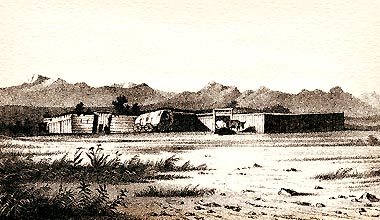
READINGS IN EARLY MORMON HISTORY
(Newspapers of the Northwest)

Misc. Northwest Newspapers
1859-1865 Articles

Fort Bridger, on the Oregon Trail, in 1847
(from Stansbury's Exploration & Survey of the Valley of the Great Salt Lake)
1845-1854 | 1855-1858 | 1859-1865 | 1866-1899
Oreg Jan 27 '62
Oreg Mar 15 '62
Oreg Feb 07 '67
Articles Index | California papers | Utah papers
 Vol. I. Portland, Monday, January 27, 1862. No. 347.
GREAT SALT LAKE CITY. -- A Frenchman from Salt Lake City, writes -- "The streets of Great Salt Lake City are perpendicular to the course of the Jordan, and cut at right angles by other streets, which run parallel to the river. The whole is surrounded by a mud rampart. Our travellers, who arrived here on the fifty-eighth day of their journey from Sacramento, were conducted to the town hall, and thence to the Union Hotel, kept by the Hon. Mr. Kinney, at that time supreme judge of the territory of Utah. All the streets are about forty yards in width, and were watered by rivulets of clear water, bordered by double rows of cotton-wood. -- Every house has a graden. Hence it is that the city is three miles in circumference. Brigham Young's residence was almost palatial. Thirty sultanas inhabit this harem, which is said to have cost $30,000 to the Mormon pontiff, whose personal fortune is said to exceed $400,000. He himself, however, lives with seventeen select wives in a house close by the palace, the roof of which is surmounted by a bee-hive, emblem of the industry and innocence of the inhabitants, or of the frequent honeymoons by which they celebrate their existence. Next to it are the "tithing" and other offices. Among other public buildings are also a court, a library and a social hall. A vast space is left for the erection of the temple, which is proceeding under the auspices of an English Mormon by the name of Angell. |
 Vol. XII. Portland, Saturday, March 15, 1862. No. 17. A Great Mormon Movement. France, England and Spain seized the moment of rebellion in the Southern States to make aggressions on Mexico. Out seceeders supposed the two first named governments would also make war upon the United States, while the same rebellion is in pregress, as an opportune moment for breaking up our Union and reducing the influence and power of our country among the nations of the world. But France and England have shown true wisdom in not gratifying the wishes of our successionists. Brigham Young and his gang, [supposing] that our Government would now, under the rebellion pressure, yield up to their wishes, have pursued a policy to drive off the officers of the General Government in Utah Territory, convened a convention, formed a [proclamation], and have given notice that polygamous Utah must be admitted into the Union as an independent State, or that she will remain out of the Union as an independent nation. The new State is to be called "Deseret." The constitution will be voted on by the people on the first Monday of March, on which day is to be held the general election, at which a governor, lieut. governor, representative to Congress, and members of the General Assembly, are to be elected. The first meeting of the General Assembly is to be called by proclamation of the Governor. Doubtless the constitution will be accepted by the people -- as it is sanctioned by Young and his official colleagues. |
 Vol. VII. Portland, Thursday, February 7, 1867. No. 1.
THE MOUNTAIN MEADOWS MASSACRE. -- In the Wasatch Mountains of Utah is a tribe of Indians who call themselves "Mooties," or are called by the whites "Muddies," and from whom the clear and sparkling river, Muddy, derives its name. The Austin REveille has the following in regard to the connection of these Indians with the Mormons in the Mountain Meadows massacre. |
Back to top of this page.
Articles Home Page | Newspaper Articles Index | History Vault
Oliver's Bookshelf | Spalding Studies Library | Mormon Classics
last updated: Nov. 1, 2007